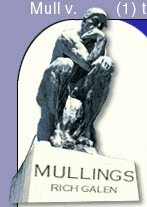|
|

|

Click here to keep up with Galen's Speaking Schedule
Looking for a back issue of Mullings? They're in the
Archives
Chirac is Mightier than Le Pen
 Monday, May 6, 2002
Monday, May 6, 2002
Click here for an Easy Print Version
From Seward, Alaska
Alaska Credit Union League Annual Meeting
- If you haven't been exclusively watching Seinfeld, Drew Carey, and Third Rock re-runs, it might have come to your attention that there has been an election for President of France.
- The election was between conservative incumbent Jacque Chirac and extreme right wing challenger Jean-Marie Le Pen.
- This election has been big news in Europe. How big? The European media have covered this story like Americans have covered the arrest of Robert Blake. That big.
- To review the bidding, the French have been governed for the past five years by a coalition of Chirac on the right and Socialist (not a pejorative, that's really the party's name) Prime Minister Lionel Jospin. Jospin was on the ballot last week in the first round, but came in a close third to Le Pen. Under French rules only the top two candidates made it into the run-off yesterday.
- Chirac got slightly less than 20 percent of the vote in the first round. Le Pen got about 17 percent in that round meaning the non-right parties got 60-or-so percent of the vote. But they didn't have a candidate in the finals.
- Why? Because Jospin's Socialist Party got only about 16 percent of the vote, meaning the remaining 40-something percent was split among the hard left parties including the Communists, the Socialists, the Trotskyists, and the Greens (who are never, it seems, described in terms reserved for the "Ultra-Right-Wing" Le Pen by the European press).
- There is a tide of thought running through the American Liberal Intelligentsia that weakening the Republican and Democratic parties will somehow be beneficial to the political process here.
- In the modern American style of politics the two major parties each contain members representing the political continuum ranging from moderate to far left in the Democratic party, and from moderate to far right in the Republican party.
- When I came back to Washington after my hiatus from politics, I met with an associate of former Speaker of the House Tip O'Neill. I asked him how O'Neill spent his day. His answer surprised me: "Managing the coalition," he said.
- The Democrats had an enormous advantage in numbers but it included very conservative Southern Democrats and very liberal Northeastern Democrats.
- If your political party has a membership of 12 people, then it is pretty easy to get everyone to sing the same words almost all of the time. But if your party wakes up one day and finds itself as the majority party then it is likely it will contain members who don't agree with each other all the time - or very often.
- The European model of politics calls for anyone disagreeing with someone else within a political party to split off an form a new party; one which will welcome only members who swear allegiance to every semi-colon of its manifesto.
- In France, this resulted in the multi-party left seeing their votes fragmented into useless splinters.
- In the US, this happens only occasionally. Ross Perot siphoned off votes on the Right from George H.W. Bush in the election of 1992. Ralph Nader drained off votes from Al Gore in 2000.
- In American politics, the trick has always been to "manage the coalition." Sometimes the Left carped at President Clinton's policies - notably on the issue of welfare reform. But they voted for the Democratic ticket on election day.
- The Right makes news now and again complaining about President Bush's policies - immigration and education come to mind - but they will vote for the Republican ticket in the end.
- Meanwhile, Jacque Chirac won the run-off with something in the area of 82% of the vote. Le Pen, who was counting on a 30 percent showing, did not get it.
- The European media is heaving a huge sigh of relief that Le Pen was stopped.
- However, there is nothing in the US press which indicates any lessons were learned: That "managing the coalition" may be difficult, but great countries are best led by those who can articulate great themes.
- On the Secret Decoder Ring page today: The International Herald Tribune coverage of the French election, a definition of "intelligentsia," and the usual stuff.
--END --
Copyright © 2002 Richard A. Galen
If you are working at a lobbying firm, a government affairs office, a coalition, or a PAC you should take a
look at this page to see how advertising in Mullings might serve your organization very well:
Current Issue |
Secret Decoder
Ring | Past
Issues | Email
Rich | Rich
Who?
Copyright �1999 Richard
A. Galen | Site design by Campaign
Solutions. | |
|
